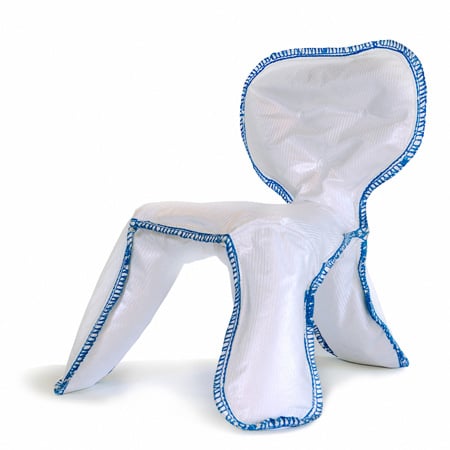Dutch Design Week: Dutch designer Chris Kabel has won the €15,000 Doen Materiaalprijs 2009 for a chair and bench made entirely of polypropylene fabric.
Kabel's Seam Chair and Bench was announced as the winner of the annual award for innovative use of materials in Eindhoven on Saturday, during Dutch Design Week.
See more work by Chris Kabel in our earlier story.
Here's the jury report followed by a statement by Kabel:
--
Jury Rapport DOEN | Materiaalprijs 2009
Date: 17 oktober 2009
Location: Klokgebouw, Eindhoven
Members of the Jury: Ursula Tischner (founder of Econcept and tutor sustainable product development at the Design Academy in Eindhoven), Ruud Koonstra (sustainable entrepeneur / founder and director of Tendris) and Arnout Visser (designer, form-finder)
A very promising technique
The Dutch Material Prize of €15.000 goes to Chris Kabel with the Seam Chair/ Seam Bench. The project of Chris Kabel is original, ingenious and very promising. For his product he uses one single material (polypropylene) that is cheap, non toxic and completely high-grade recyclable. With completely innovating technique he shapes this material into lightweight and rigid furniture pieces.
For a sustainable innovation in the future it is important that objects are made of a single material. It saves time in recycling and the material does not become conterminated. The technique as is used by Kabel saves energy and creates a lightweight material that can replace the toxic and single use thermosetting glass- and carbon fiber resin systems.
Resourceful and passionate designers that manage to combine existing knowledge and personal insights using unorthdox methods are of crucial importance for innovation.
The jury is impressed by the potential of the novel technique. A low tech approach leads to high tech possibilities. The jury feels this technique is applicable to many more objects. With this prize the jury hopes to stimulate Chris Kabel to develop the technique further and investigate new applications.
--
Statement by Chris Kabel:
In 2007 I started a research project together with the material lab of the Aerospace Department of the Technical university in Delft and composites producer Lankhorst Indutech.
I wanted to see if the material Pure, that is produced by Lankhorst, could also find applications outside of the ballistic and automotive industries where it was mainly used until then. Pure is a 100% polypropylene (PP) woven fabric (comparable with the yellow and blue IKEA bags) with special properties
Pure starts as a textile cloth that becomes very rigid under the right pressure and temperature. It is woven of 100% PP yarn that has an inner core that melts at 180°C and an outer core that melts at around 130°C. At the right temperature the outer core melts and impregnates and fixates the inner cores; this process is comparable with resin and glass or carbon fibres. Having similar strenght Pure is 100% recyclabe as aposed to the glass fibre reinforced plastics that are currently used in the (furniture) industry. This makes Pure a 100% recyclable and it doesn't nered to be downgraded, it can be used over and over again –just like gold-.
Because the Pure material is a fabric when not hardened it is also sewable. this brings another advantage: when a bag in the shape of a chair is sewn and filled like a sandbag so that it gets its shape you do not even need a mould to produce it. It is then put in a reusable bag and put in the oven on high pressure. after around an hour baking on 130°C (this is less than an apple pie) the fibers are impregnated and fixed together. A hole lets the sand come out and you are left with an ultra light piece of furniture. The blue seam is also PP by the way.
The goal of this chair protoype apart from seating is that it is a harbinger. With this chair I want to show that you do not need resin and glass or carbon fibres to create superlight (using little material) and superstrong constructions that are 100% recyclable.

